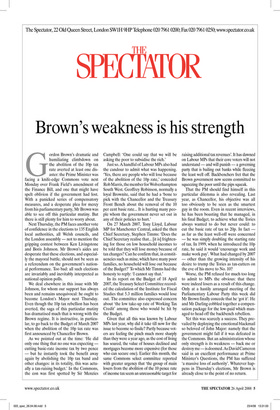Brown’s weakness is his strength
Gordon Brown’s dramatic and humiliating climbdown on the abolition of the 10p tax rate averted at least one disaster: the Prime Minister was facing a knife-edge Commons vote next Monday over Frank Field’s amendment of the Finance Bill, and one that might have spelt oblivion if the government had lost. With a panicked series of compensatory measures, and a desperate plea for mercy from his parliamentary party, Mr Brown was able to see off this particular mutiny. But there is still plenty for him to worry about.
Next Thursday, the PM faces another vote of confidence in the elections to 135 English local authorities, all Welsh councils, and the London assembly — not to mention the gripping contest between Ken Livingstone and Boris Johnson. Mr Brown’s aides are desperate that these elections, and especially the mayoral battle, should not be seen as a referendum on the government’s national performance. Too bad: all such elections are invariably and inevitably interpreted as national opinion polls.
We deal elsewhere in this issue with Mr Johnson, for whom our support has always been and remains unequivocal: he ought to become London’s Mayor next Thursday. Even though the 10p tax rebellion has been averted, the saga of this particular mutiny has dramatised much that is wrong with the Brown regime. It is instructive, in particular, to go back to the Budget of March 2007 when the abolition of the 10p tax rate was first announced by Chancellor Brown.
As we pointed out at the time: ‘He did only one thing that no one was expecting — cutting basic-rate income tax by two pence — but he instantly took the benefit away again by abolishing the 10p tax band and other changes: in its totality, this was actually a tax-raising budget.’ In the Commons, the con was first spotted by Sir Menzies Campbell: ‘One could say that we will be asking the poor to subsidise the rich.’ Just so. A handful of Labour MPs also had the candour to admit what was happening. ‘Yes, there are people who will lose because of the abolition of the 10p rate,’ conceded Rob Marris, the member for Wolverhampton South West. Geoffrey Robinson, normally a loyal Brownite, said that he had a ‘bone to pick with the Chancellor and the Treasury Front Bench about the removal of the 10 per cent basic rate... It is hurting many people whom the government never set out in any of their policies to hurt.’ On 27 March 2007, Tony Lloyd, Labour MP for Manchester Central, asked the then Chief Secretary, Stephen Timms: ‘Does the Chief Secretary realise that... [it is] frightening for those on low household incomes to be told that they will lose money because of tax changes? Can he confirm that, in constituencies such as mine, which have many poor families, no household will lose out because of the Budget?’ To which Mr Timms had the honesty to reply: ‘I cannot say that.’ In its report on the Budget of 18 April 2007, the Treasury Select Committee recorded the calculation of the Institute for Fiscal Studies that 5.3 million families would lose out. The committee also expressed concern about ‘the low take-up rate of Working Tax Credit’ among those who would be hit by the Budget.
Given that all this was known by Labour MPs last year, why did it take till now for the issue to become so fissile? Partly because voters are feeling the pinch much more sharply than they were a year ago, as the cost of living has soared, the value of houses declined and mortgages become more expensive (for those who can secure one). Earlier this month, the same Commons select committee reported with greater urgency that ‘the group of main losers from the abolition of the 10 pence rate of income tax seem an unreasonable target for raising additional tax revenues’. It has dawned on Labour MPs that their core voters will not understand — and will punish — a governing party that is bailing out banks while fleecing the least well off. Backbenchers fret that the Brown government now seems committed to squeezing the poor until the pips squeak.
That the PM should find himself in this particular dilemma is also revealing. Last year, as Chancellor, his objective was all too obviously to be seen as the smartest guy in the room. Even in recent interviews, he has been boasting that he managed, in his final Budget, to achieve what the Tories always wanted to do but never could: to cut the basic rate of tax to 20p. In fact — as far as the least well-off were concerned — he was simply doubling the starting rate of tax. In 1999, when he introduced the 10p rate, he said it would ‘encourage work and make work pay’. What had changed by 2007 — other than the growing intensity of his desire to trump the Tories as tax-cutters on the eve of his move to No. 10?
Worse, the PM refused for much too long to admit to MPs the obvious: that there were indeed losers as a result of this change. Only at a hastily arranged meeting of the Parliamentary Labour Party this week did Mr Brown finally concede that he ‘got it’. He and Mr Darling cobbled together a compensation package for the low-paid which managed to head off the backbench rebellion.
Yet this was scarcely a success. They prevailed by deploying the emotional blackmail so beloved of John Major: namely that the government might fall if it was defeated in the Commons. But an administration whose only strength is its weakness — back me or destroy me — is doomed. As David Cameron said in an excellent performance at Prime Minister’s Questions, the PM has suffered ‘a massive loss of authority’. Whatever happens in Thursday’s elections, Mr Brown is already close to the point of no return.










































































 Previous page
Previous page